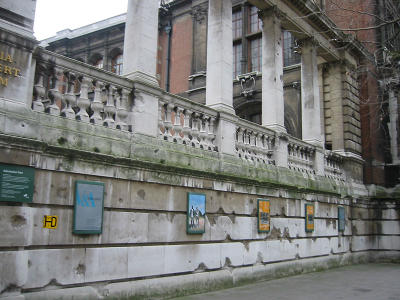I’ve made a habit, for some years now, of collecting quotes that strike me as profoundly insightful or interesting, probably for all the same reasons that others do — for the keenly focused insight and concise expression of ideas they offer, as well as the inspiration and distilled wisdom they can call to mind on a moment’s notice.
Having recently sifted through the assortment of text files where I’ve been gradually stashing these hand-selected quotes away, I’ve assembled the best of them into a new “Quotes” page that I invite you all to visit.
The topics include Liberty & Economics, Cultural Confidence, War, and keeping Perspective. I hope my readers will draw as much enjoyment from them as I have.
UPDATE 2010-02-08: I’ve added several more selected gems, dug out of a handwritten journal I’ve kept off and on since September 2002. Enjoy!
During a recent visit to Urban Ore, a sort of catch-all used junk/treasure store and minor Berkeley institution, I found myself sucked into the used book section. It’s inevitable, it seems — I do the same thing at antique stores, and have to keep a close eye on my watch when doing so, lest I lose all track of time browsing the worn spines with curious titles, leafing through pages of words once read and now mostly forgotten, as if searching for nothing in particular and something I can’t quite identify.
Among the more interesting relics I examined that day was a 1946 high school yearbook, whose first dozen or so pages were devoted to class-portraits-in-uniform of young men (and more than a few young women among them) who had served in the U.S. armed forces in World War II. I wish I could remember the moving words of humble gratitude that were placed therein to honor their service (and in many cases their ultimate sacrifice). I wondered if the yearbook committees of today were addressing comparable subject matter with such reverence.
The yearbook went back on the shelf, but another book that caught my eye went home with me — a somewhat yellowed and tattered but otherwise intact copy of a poem by Stephen Vincent Benét, whose earlier work “Listen to the People” I had read and deeply enjoyed. “Western Star” is the title of this one, a book-length story, published in 1943, about the American frontier and those who made and lived it.
I picked it up and started reading tonight, and am enjoying it very much so far. Three pages into the “Prelude” came a passage that seemed especially appropriate to excerpt here:
The stranger finds them easy to explain
(Americans, I said Americans,)
And tells them so in public and at length.
(It’s an old Roman virtue to be frank,
A tattered Grecian parchment on the shelves,
Explaining the barbarians to themselves,
A lost, Egyptian prank.)
Here is the weakness. On the other hand,
Here is what really might be called the strength.
And then he makes a list.
Sometimes he thumps the table with his fist.
Sometimes, he’s very bland.
O few, stiff-collared and unhappy men
Wilting in silence, to the cultured boom
Of the trained voice in the perspiring room!
O books, O endless, minatory books!
(Explaining the barbarians to themselves)
He came and went. He liked our women’s looks.
Ate lunch and said the skyscrapers were high,
And then, in state, passed by,
To the next lecture, to the desolate tryst.
Sometimes to waken, in the narrow berth
When the green curtains swayed like giant leaves
In the dry, prairie-gust,
Wake, with an aching head, and taste the dust,
The floury wheat-dust, smelling of the sheaves,
And wonder, for a second of dismay,
If there was something that one might have missed,
Between the chicken salad and the train,
Between the ladies’ luncheon and the station,
Something that might explain one’s explanation
A section of the exterior walls of London’s Victoria & Albert Museum still bears damage from the Blitz, which has been preserved as a reminder of a time when Londoners lived under constant threat of attack.
I snapped these pictures during a visit last year, not imagining that I would soon revisit them with new eyes.











